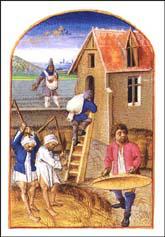Richard Strongbow
Richard, the son of Gilbert de Clare, was born in about 1130. His mother was Elizabeth, the daughter of Robert de Beaumont, the Earl of Leicester.
In 1138 Stephen created Gilbert the first Earl of Pembroke. On the death of his father in 1148, Richard became the 2nd Earl of Pembroke.
In 1169, Dermont MacMurrough, the king of Leinster was defeated by Roderic, the king of Connacht. Dermont went to Wales and asked Richard to help him in his war against Roderic. Richard agreed to help on condition that he was allowed to marry Dermont's daughter, Eva.
With Richard de Clare's help Dermont was able to defeat the king of Connacht's forces, who were armed only with slings and stones. Richard de Clare, whose army relied heavily on Welsh archers, soon obtained the nickname 'Strongbow'.
When Dermont died in 1171, Strongbow became the new king of Leinster. Henry II of England became concerned about Strongbow's growing power in Ireland and so later that year he arrived with his own army. Strongbow was forced to surrender Leinster to the king. The land was then given back to Strongbow in return for the service of 100 knights.
Henry II now began establishing his hold over Ireland. He built several castles and persuaded most of the Irish kings to accept him as their overlord.
In 1185 Henry sent his son John to rule Ireland. Disliked by both the Normans and the Irish, John was unable to establish himself in Ireland and six months later was forced to return to England.
Several attempts were made by English kings to take control of the whole of Ireland. These campaigns failed and royal authority was limited to a few hundred square miles round Dublin known as 'the Pale'.
Strongbow did manage to keep control of Leinster. To help the local economy he encouraged the development of towns and markets in the area.
To maintain control he built several castles. He divided the territory into five lordships: Wexford, Kilkenny, Kildare, Dunamase and Carlow. A seneschal, based at Kilkenny Castle, was appointed to administer the land for the Clare family. He received £100 a year, which made him the highest paid of all Strongbow's officials.
Richard de Clare, Earl of Pembroke, died in 1176. The Irish estates were inherited by his daughter Isabel and her husband William Marshall. The couple had five boys and five girls. When William Marshall died none of his sons were left alive and so the Irish estates were divided up among the five daughters and their families. By 1262 only the lordship of Kilkenny remained under the control of the Clare family. The lordship was valued at £343 a year and in return the Clare family were required to provide the king with 22 knights. However, instead of supplying knights, the Clare family chose to pay a regular scutage of £44 to the king.

